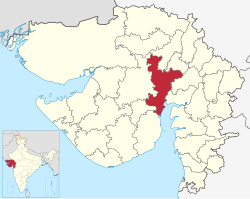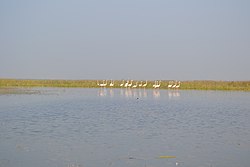Ahmedabad district is a district comprises the city of Ahmedabad, in the central part of the state of Gujarat in western India. It is the seventh most populous district in India (out of 739).[1] Amdavad Distrrict Surrounded By Kheda district in the east, Mehsana district in the north, Anand district in the south and Surendranagar district in the west.
Ahmedabad District | |
|---|---|
Clockwise from top-left: Sabarmati Ashram, Hutheesing Jain Temple, Jami Masjid, Ahmedabad, birds in Nal Sarovar, Sardar Patel Stadium | |
 Ahmedabad district location in Gujarat | |
| Coordinates: 23°1′48″N 72°34′48″E / 23.03000°N 72.58000°E | |
| Country | |
| State | Gujarat |
| Municipalities | Bareja, Dholka, Viramgam, Bavla, Dhandhuka, Sanand |
| Headquarters | Ahmedabad |
| Taluks | Ahmedabad City, Daskroi, Sanand, Viramgam, Detroj-Rampura, Mandal, Bavla, Dholka, Dhandhuka, Dholera |
| Government | |
| • District Collector | Sandip J. Sagale, IAS |
| Area | |
• Total | 8,087 km2 (3,122 sq mi) |
| Population (2011)[1] | |
• Total | 7,214,225 |
| • Rank | 1 of 33 in Gujarat |
| • Density | 890/km2 (2,300/sq mi) |
| Time zone | UTC+5:30 (IST) |
| PIN | 380xxx |
| Telephone code | 91 04142 |
| Vehicle registration | GJ-1, GJ-27, GJ-38 |
| Largest city | Ahmedabad |
| Sex ratio | 904 ♂/♀ |
| Literacy | 85.31% |
| Legislature type | elected |
| Lok Sabha constituency | Ahmedabad East, Ahmedabad West |
| Avg. summer temperature | 41.5 °C (106.7 °F) |
| Avg. winter temperature | 11.8 °C (53.2 °F) |
| Website | Official website
ahmedabad |
| [2] | |
Etymology
editThe area around Ahmedabad has been inhabited since the 11th century, when it was known as Ashaval.[3] At that time, Karna, the Chaulukya (Solanki) ruler of Anhilwara (modern Patan), waged a successful war against the Bhil king of Ashaval,[4] and established a city called Karnavati on the banks of the Sabarmati.[5]
In 1411, this area came under the control of Muzaffar Shah I's grandson, Sultan Ahmed Shah, who selected the forested area along the banks of the Sabarmati river for a new capital city. He laid the foundation of a new walled city near Karnavati and named it Ahmedabad after himself.[6][7] According to other versions, he named the city after four Muslim saints in the area who all had the name Ahmed.[8]
Climate
edit| Climate data for Ahmedabad | |||||||||||||
|---|---|---|---|---|---|---|---|---|---|---|---|---|---|
| Month | Jan | Feb | Mar | Apr | May | Jun | Jul | Aug | Sep | Oct | Nov | Dec | Year |
| Mean daily maximum °C (°F) | 28.3 (82.9) |
30.4 (86.7) |
35.6 (96.1) |
39.8 (103.6) |
41.5 (106.7) |
38.4 (101.1) |
33.4 (92.1) |
31.8 (89.2) |
34.0 (93.2) |
35.8 (96.4) |
32.8 (91.0) |
29.3 (84.7) |
41.5 (106.7) |
| Mean daily minimum °C (°F) | 20.1 (68.2) |
13.9 (57.0) |
18.9 (66.0) |
23.7 (74.7) |
26.2 (79.2) |
27.2 (81.0) |
25.6 (78.1) |
24.6 (76.3) |
24.2 (75.6) |
21.1 (70.0) |
16.6 (61.9) |
13.2 (55.8) |
11.8 (53.2) |
| Average rainfall mm (inches) | 2.0 (0.08) |
1.0 (0.04) |
0 (0) |
3.0 (0.12) |
20 (0.8) |
103.0 (4.06) |
247.0 (9.72) |
288.0 (11.34) |
83.0 (3.27) |
23.0 (0.91) |
14.0 (0.55) |
5.0 (0.20) |
789 (31.1) |
| Average rainy days (≥ 0 mm) | 0.3 | 0.3 | 0.1 | 0.3 | 0.9 | 4.8 | 13.6 | 15.0 | 5.8 | 1.1 | 1.1 | 0.3 | 43.6 |
| Mean monthly sunshine hours | 288.3 | 274 | 279 | 307 | 329 | 237.0 | 130 | 111.6 | 222 | 291 | 273 | 288.3 | 3,020 |
| Source: HKO[9] | |||||||||||||
Talukas
editFollowing are the talukas of Ahmedabad district:
Talukas in Ahmedabad City - East
editTalukas in Ahmedabad City - West
editTalukas in Ahmedabad Suburban
editTalukas in Rural North Ahmedabad
editTalukas in Rural South Ahmedabad
editVillages
editPolitics
editDemographics
edit| Year | Pop. | ±% p.a. |
|---|---|---|
| 1901 | 681,713 | — |
| 1911 | 717,107 | +0.51% |
| 1921 | 765,900 | +0.66% |
| 1931 | 850,077 | +1.05% |
| 1941 | 1,178,608 | +3.32% |
| 1951 | 1,516,191 | +2.55% |
| 1961 | 2,016,668 | +2.89% |
| 1971 | 2,765,925 | +3.21% |
| 1981 | 3,706,573 | +2.97% |
| 1991 | 4,631,351 | +2.25% |
| 2001 | 5,893,164 | +2.44% |
| 2011 | 7,214,225 | +2.04% |
| source:[11] | ||
According to the 2011 census Ahmedabad district has a population of 7,214,225,[1] roughly equal to Hong Kong[12] or the U.S. state of Washington.[13] This gives it a ranking of 8th in India (out of a total of 640).[1] The district has a population density of 983 inhabitants per square kilometre (2,550/sq mi) .[1] Its population growth rate over the decade 2001-2011 was 22.31%.[1] Ahmedabad has a sex ratio of 903 females for every 1000 males,[1] and a literacy rate of 86.65%.[1]
The divided district has a population of 7,045,313, of which 6,028,152 (85.56%) lived in urban areas. Ahmedabad had a sex ratio of 904 females per 1000 males. Scheduled Castes and Scheduled Tribes make up 747,806 (10.61%) and 88,911 (1.26%) of the population respectively.[1]
Cities and Towns
editThe population of all cities and towns in the Ahmedabad district by census years.[14]
| Name[a] | Status | Population
Census 1991-03-01 |
Population
Census 2001-03-01 |
Population
Census 2011-03-01 |
|---|---|---|---|---|
| Ahmadabad | Municipal Corporation with Outgrowth (Metropolis) | 2,876,710 | 3,694,974 | 5,633,927 |
| Ahmadabad Cantonment | Cantonment (Board) | 11,967 | 14,706 | 7,588 |
| Bareja | Municipality | ... | 15,427 | 19,690 |
| Barwala | Municipality | ... | 16,048 | 17,951 |
| Bavla | Municipality with Outgrowth | 25,391 | 30,871 | 42,458 |
| Bopal | Census Town | ... | 12,181 | 37,635 |
| Dhandhuka | Municipality | 27,781 | 29,572 | 32,475 |
| Dholka | Municipality with Outgrowth | 49,860 | 61,569 | 80,945 |
| Nandej | Census Town | 6,878 | 7,642 | 9,176 |
| Ranpur | Census Town | ... | 14,486 | 16,944 |
| Sanand | Municipality with Outgrowth | 25,674 | 32,417 | 95,890 |
| Singarva | Census Town | 8,183 | 9,889 | 12,547 |
| Viramgam | Municipality | 50,788 | 53,094 | 55,821 |
Religion
editHindus are 5,885,869 while Muslims are 871,887, Jains are 208,575 and Christians 50,631.[15]
Language
editAt the time of the 2011 census, 74.21% of the population spoke Gujarati, 16.01% Hindi, 2.78% Urdu, 1.80% Sindhi, 1.64% Marathi and 1.55% Marwari as their first language.[16]
Notable people
edit- Acharya Hemachandra (1089–1172) Jain polymath. Born in Dhandhuka.[17]
- Joravarsinh Jadav (born 1940), folklorist
Notes
edit- ^ Source: Office of the Registrar General and Census Commissioner (web), Delimitation Commission of India (web), Rand McNally International Atlas 1994, School of Planning & Architecture (web)
References
edit- ^ a b c d e f g h i "District Census Hand Book – Ahmedabad" (PDF). Census of India. Registrar General and Census Commissioner of India.
- ^ "District wise Statistics | NITI Aayog, (National Institution for Transforming India), Government of India". 164.100.94.191. Retrieved 2023-01-05.
- ^ Turner, Jane (1996). The Dictionary of Art. Vol. 1. Grove. p. 471. ISBN 978-1-884446-00-9.
- ^ Michell, George; Snehal Shah; John Burton-Page; Mehta, Dinesh (28 July 2006). Ahmadabad. Marg Publications. pp. 17–19. ISBN 81-85026-03-3.
- ^ Gopal, Madan (1990). K.S. Gautam (ed.). India Through the Ages. Publication Division, Ministry of Information and Broadcasting, Government of India. p. 173.
- ^ More, Anuj (18 October 2010). "Baba Maneknath's kin keep alive 600-yr old tradition". The Indian Express. Archived from the original on 11 April 2013. Retrieved 21 February 2013.
- ^ This ambiguity is similar to the case of Tsar Peter the Great naming his new capital "Saint Petersburg", referring officially to Saint Peter but in fact also to himself.
- ^ "History of Ahmedabad". Ahmedabad Municipal Corporation, egovamc.com. Archived from the original on 23 February 2016. Retrieved 14 May 2012.
- ^ "Ahmedabad Climate Record". Archived from the original on 15 August 2019. Retrieved 1 May 2012.
- ^ "Bhupendra Patel named Gujarat CM again". news.abplive.com. Retrieved 2022-12-10.[permanent dead link]
- ^ Decadal Variation In Population Since 1901
- ^ US Directorate of Intelligence. "Country Comparison:Population". Archived from the original on June 13, 2007. Retrieved 2011-10-01.
Hong Kong 7,122,508 July 2011 est.
- ^ "2010 Resident Population Data". U. S. Census Bureau. Archived from the original on 2010-12-25. Retrieved 2011-09-30.
Washington 6,724,540
- ^ "Gujarat (India): Districts, Cities and Towns - Population Statistics, Charts and Map". citypopulation.de. Retrieved 2023-03-17.
- ^ a b "Population by Religion - Gujarat". censusindia.gov.in. Registrar General and Census Commissioner of India. 2011.
- ^ a b "Table C-16 Population by Mother Tongue: Gujarat". censusindia.gov.in. Registrar General and Census Commissioner of India.
- ^ "Hemacandra". Jain World. Archived from the original on April 29, 2008. Retrieved 2008-05-06.
External links
edit- Official website
- Ahmedabad RTO
- Geographic data related to Ahmedabad district at OpenStreetMap





